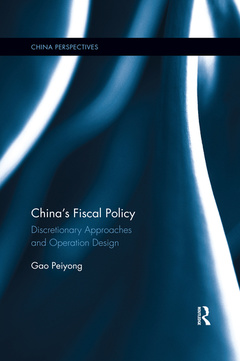China's Fiscal Policy Discretionary Approaches and Operation Design China Perspectives Series
Auteur : Peiyong Gao

As an important macroeconomic variant, the fiscal revenue and expenditure can influence the operation of the whole economic and social activities by changing the existing GDP distribution pattern, affecting the consumption and investment of enterprises and people, etc. Thus, fiscal policy has always been a primary instrument of macroeconomic regulation.
This book imports fiscal policy into the framework of macroeconomic analysis and through the analysis of the former, it unfolds the major changes of China's macroeconomic operation in the past 20 years. This book begins with China's rejoining the General Agreement on Tariffs and Trade (GATT) in the 1990s which enabled China to deepen the reform and join the international market finally. It elaborates on the challenges China's taxation would be confronted with after rejoining the GATT, including the decrease of tax revenue and higher requirements for tax reform. Then this book combs China's fiscal policies under various economic situations chronologically?tax policy under the background of deflation, proactive fiscal policy at the beginning of 21st century, macroeconomic policy options facing a complicated and volatile economy, etc. How to deal with the ¡°new normal¡± of development China's economy has entered is also addressed.
This book will appeal to scholars and students of economics and China's economic studies.
List of figures. Foreword for the Chinese Edition. Acknowledgments. Chapter 1 China's Taxation after Rejoining the GATT Chapter 2 The Evolving Foreign-Related Preferential Tax Policy in China Chapter 3 Overall Accounting and Detailed Accounting: Consideration about China's Current Fiscal Policy Chapter 4 Selection of Tax Policy under the Background of Deflation: Discussion on Current Tax Cut Claims Chapter 5 Prevention and Control of SARS and Arrangement of Finance and Taxation: Influence and Countermeasures Chapter 6 Proactive Fiscal Policy Pursues for both Philosophical and Initiative Breakthroughs Chapter 7 Icebreaking Prudent Fiscal Policy: Analysis of the Current Orientation of China's Fiscal Policy Chapter 8 A New Round of Proactive Fiscal Policy: Progress Review and Tendency Forecast Chapter 9 Current Economic Situation and 2012 Fiscal Policy Chapter 10 Macroeconomic Policy Options under the Background of a Complicated and Volatile Economy Chapter 11 Remain Calm in the Face of Declining Growth of Financial Revenue Chapter 12 Promotion on Local Government Debt to the "New Normal" by In-depth Reform Chapter 13 Profound Knowledge in the "New Normal" of Finance Index
Gao Peiyong is the director of Institute of Economics, Chinese Academy of Social Sciences. His main research interests include theoretic research, policy analysis and institution design in the field of public finance and taxation.
Date de parution : 04-2020
15.6x23.4 cm
Date de parution : 07-2017
15.6x23.4 cm
Thèmes de China's Fiscal Policy :
Mots-clés :
Proactive Fiscal Policy; China; China’s Fiscal Policy; Fiscal Policy in the Macroeconomic Regulation and Control System; China’s Macroeconomic Policy; Macroeconomic; Macroeconomic Policy Package; Fiscal Policy; Fiscal Expenditure; Gao Peiyong; China’s Tax Revenue; Economics; Fiscal Revenue; China Social Sciences Press; National Fiscal Revenue; Discretionary Approaches; Expansionary Fiscal Policy; Operation Design; Prudent Monetary Policy; China’s Fiscal; Vat Reform; Financial Revenue; Gdp Growth; Treasury Bonds; Reform Dividend; Macro-control Measures; Central Government; Local Government Debt; Gdp Decrease; Prudent Fiscal Policy; Gdp Growth Rate; Fiscal Policy Orientation; Neutral Fiscal Policy; Issuing Treasury Bonds



